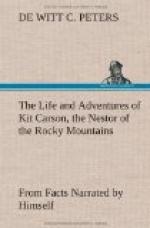and when within one hundred yards of the Mexican camp,
Kit Carson’s horse, occupying a leading position
in the column of attack, accidentally fell, and threw
his rider with such force as to break the wood part,
or stock, of his rifle into several pieces, rendering
it useless. His position, for a short time, was
precarious. Being foremost in the charge when
the accident happened, the whole troop of horse came
galloping over him as he lay upon the ground.
His escape was almost a miracle. When the last
horseman had passed, Kit arose, and was quite happy
to find that he had received only slight contusions,
which did not in the least impair his movements or
strength of body. Casting a hasty glance over
the field, he discovered a dead dragoon, not far distant
from the spot where he himself had fallen. Instantly
running up to the poor fellow, he relieved him of
his gun and cartridge-box. Being once more armed,
he rushed forward at the top of his speed and plunged
into the thickest of the fight, which was then severely
contested. Captain Johnson and several of the
more advanced soldiers had been killed by the bullets
of the enemy, almost at the same instant that Kit Carson’s
horse had fallen. It is not at all unlikely,
therefore, that the accidental falling of his horse
had been the means of saving Kit Carson’s life.
After a desperate and deadly conflict, Moore and his
men dislodged the enemy, causing them to retreat.
They were followed by the Americans, but, unfortunately
for their complete success, the large majority of
the latter were mounted on mules. These, when
the firing commenced, became almost unmanageable.
But forty of the entire command of General Kearney
were mounted on horses, and these were none the best
for cavalry purposes, having been but recently broken
to the saddle. They had been captured since the
arrival of the American forces in the country, from
a party of Mexicans, who were en route to Sonora, by
Lieutenant Davidson and twenty-five dragoons, assisted
by Kit Carson. By the uncontrollable actions
of the stubborn mules, Moore’s men became greatly
separated and could not act in concert. This rendered
the pursuit, so far as the enemy was concerned, nearly
harmless.
The Mexicans, quickly perceiving the condition of
their assailants, and comprehending the chances, which
the apparent difficulty gave them, at once rallied
and turned on their pursuers. The fight was renewed
with most determined courage. The Mexicans fought
with a bravery and success which turned the hitherto,
comparatively speaking, bloodless victory of the Americans,
into a terrible slaughter. Every moment saw some
brave dragoon yield up his life to the deadly bullets
or blows of the exasperated Mexicans. Out of the
forty dragoons who were mounted on horses, thirty-six
were either killed or severely wounded. Among
the names to be added to the sad list already killed,
was Captain Moore, “as brave a man,” says
Kit Carson, “as ever drew breath in any service.”
As fast as the scattered American soldiers could reach
the scene of carnage, they joined in the battle; but,
the Mexicans, elated by their success, fought like
demons, and seemed to sweep everything before them.




